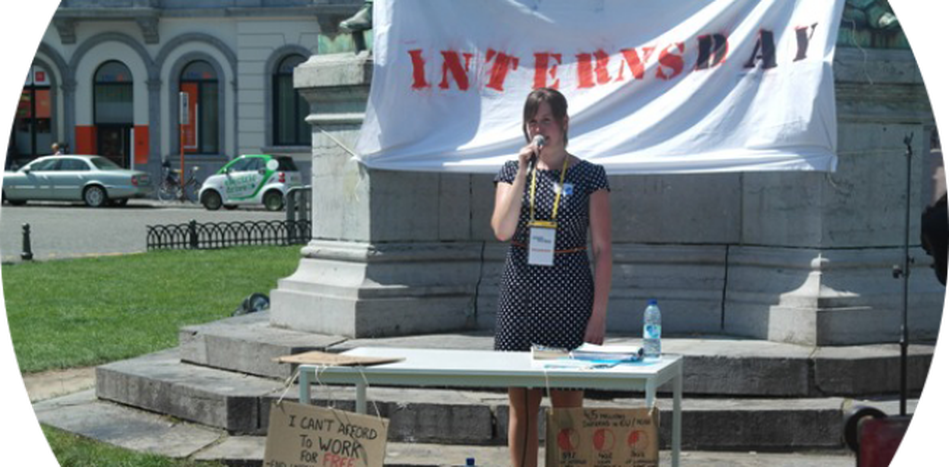
Lidija Globokar: Interns to Say “No” to Unfair Working Conditions
Published on
Born in Germany to Slovenian partners, Lidija Globokar grew up bilingually and “biculturally”. She guesses that this has influenced her choices of studies as she is BA in Languages and Business and MA in Communication and European Affairs.
Lidija at European Interns’ Day in Brussels
Interview done by Lenka Curillova
Edited by: Stefan Alijevikj and Ana Alibegova
Born in Germany to Slovenian partners, Lidija Globokar grew up bilingually and “biculturally”. She guesses that this has influenced her choices of studies as she is BA in Languages and Business and MA in Communication and European Affairs. During her Bachelor’s she takes the opportunity to spend two years abroad in France and Ireland, and she conducts her Master’s degree afterwards in Brussels, Belgium. She has a strong interest in learning new languages, getting to know people from different countries, and as well she considers herself a true “Europhile” embracing the European spirit that together we are stronger. Mladiinfo International has met with Lidija Globokar in Skopje, Macedonia as she was guest to one our event. Today we deliver to you our interview with her where she reflects on her professional development and her work and engagement with Project 668, a professional development platform for current and former European Union trainees.
M! International: In 2012, you have applied for a traineeship at the European Commission and this was an important point in your career developments. What was the initial motivation to conduct this journey?
Lidija: After my year of study in Ireland, I completed an internship at the office of a Slovenian MEP in Brussels. This internship triggered my deep wish to work one day in the area of EU affairs. Before that it has been clear to me that I want to work in communications and after that the component “EU Affairs” was added to my job wish list. Therefore, I decided to do the Executive Master’s in Communications and European Affairs at IHECS in Brussels which perfectly combined both fields and was very project-oriented. As the Master’s included an internship, it was clear to me that I want to complete it in an EU institution. As I have had the opportunity to look behind the scenes of the European Parliament already I wanted to have a closer look at the “guardian of the Treaties”, as the European Commission is called.
Already at the end of my traineeship I started applying for different jobs and internships in Brussels. As expected this was a tough task to complete. I had to admit to myself that I might not find anything in Brussels and also started to look for jobs in Germany. By the end of my traineeship I had an internship offer in Brussels and a job offer in Frankfurt, I chose the latter because I didn’t want to be “the intern” anymore and was looking for a bit more stability and security.
M! International: Whilst on your traineeship in the EU Commission you and your colleagues have launched the Project 668, therefore what are its goals and activities? What has inspired you to create this initiative?
Lidija: Project 668 was founded by a group of European Commission (EC) trainees, true. We started it during our traineeship in April 2012 and our motivation was our concern about the high rate of youth unemployment in Europe and the large number of people that we met during our traineeship who told us that they could not go back to their country because there were no jobs. All of them were very well educated, spoke at least 3 languages, had several Master’s degrees and had done traineeships. We therefore wanted to contribute to the fight against youth unemployment and founded Project 668 (Facebook page). We created a database of EC trainees and approached companies, organisations and all sorts of consultancies with this database. After we expanded our target group to all EU trainees we focused on our social media channels because it was too difficult to handle the database for such a large amount of people.
We consider Project 668 to be a professional development platform for current and former European Union (EU) trainees. Its aim is to help other trainees break into the job market, develop their professional skill set and manage their careers. There is a gap between EU trainees and the “Euro-bubble job market” and Project 668 strives to close this gap. We do this mostly online by sharing vacancies and quality content on all the different aspects of professional development and job hunting.



